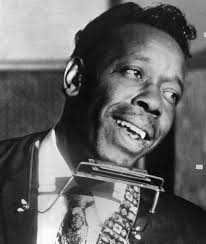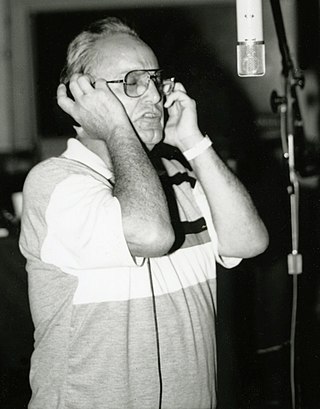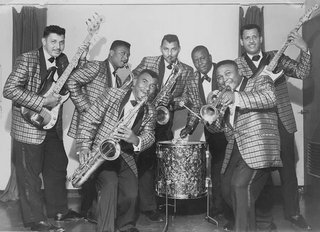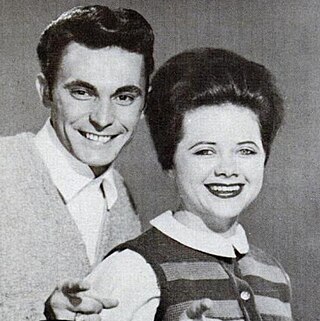
Slim Harpo was an American blues musician, a leading exponent of the swamp blues style, and "one of the most commercially successful blues artists of his day". He played guitar and was a master of the blues harmonica, known in blues circles as a "harp". His most successful and influential recordings included "I'm a King Bee" (1957), "Rainin' in My Heart" (1961), and "Baby Scratch My Back" (1966), which reached number one on Billboard's R&B chart and number 16 on its broader Hot 100 singles chart.
Swamp pop is a music genre indigenous to the Acadiana region of south Louisiana and an adjoining section of southeast Texas. Created in the 1950s by young Cajuns and Creoles, it combines New Orleans–style rhythm and blues, country and western, and traditional French Louisiana musical influences. Although a fairly obscure genre, swamp pop maintains a large audience in its south Louisiana and southeast Texas homeland, and it has acquired a small but passionate cult following in the United Kingdom, and Northern Europe

Freddy Fender was an American Tejano singer-songwriter, known for his work as a solo artist and in the groups Los Super Seven and the Texas Tornados. His signature sound fused country, rock, swamp pop and Tex-Mex styles.

Polycarp was a fictional character who was a local children's television show host. His program, Polycarp and Pals, was broadcast from the mid-1960s to the early 1970s on KATC Channel 3 in Lafayette, Louisiana, USA.
Maison de Soul is a Louisiana-based Zydeco and blues record label. It was founded in 1974 in Ville Platte, Louisiana by Floyd Soileau and remains under his ownership. It is one of four record labels under Soileau's Flat Town Music Company umbrella, and combined the Flat Town labels make up "the largest body of Cajun, zydeco, and swamp music in the world". Living Blues magazine has called Maison de Soul "the country's foremost zydeco label".
James Floyd Soileau is an American record producer.
"Jambalaya (On the Bayou)" is a song written and recorded by American country music singer Hank Williams that was first released in July 1952. It is Williams' most recorded song. Named for a Creole and Cajun dish, jambalaya, it spawned numerous recordings and has since achieved popularity in several different music genres.

Leslie Johnson, better known as Lazy Lester, was an American blues musician who sang and played the harmonica and guitar. In a career spanning the 1950s to 2018, he pioneered swamp blues, and also played harmonica blues, rhythm and blues and Louisiana blues.

Barbara Lynn is an American rhythm and blues and electric blues guitarist, singer and songwriter. She is best known for her R&B chart-topping hit, "You'll Lose a Good Thing" (1962). In 2018, Lynn received a National Heritage Fellowship.

Otis Verries Hicks, known as Lightnin' Slim, was an American blues musician who played Louisiana blues and swamp blues for Excello Records. The blues critic ED Denson ranked him as one of the five great bluesmen of the 1950s, along with Muddy Waters, Little Walter, Howlin' Wolf and Sonny Boy Williamson.

Rod Bernard was an American singer who helped to pioneer the musical genre known as "swamp pop", which combined New Orleans-style rhythm and blues, country and western, and Cajun and black Creole music. He is generally considered one of the foremost musicians of this south Louisiana-east Texas idiom, along with such notables as Bobby Charles, Johnnie Allan, Tommy McLain, and Warren Storm.

Joseph Denton "Jay" Miller was an American record producer and songwriter from Louisiana, whose Cajun, swamp blues, and swamp pop recordings influenced American popular culture.

Jimmy Yves Newman, better known as Jimmy C. Newman, was an American country music and cajun singer-songwriter and long-time star of the Grand Ole Opry.

Cookie and his Cupcakes was an American swamp pop band from south Louisiana, best known for their 1959 hit "Mathilda", the unofficial anthem of swamp pop music.

"Wasted Days and Wasted Nights" is an American country and pop song recorded by Freddy Fender. It is considered by many to belong to the swamp pop idiom of south Louisiana and southeast Texas that had such a major musical impact on Fender.

Dale Houston was an American singer who in a duo with his performing partner, Grace Broussard, hit the Billboard chart as Dale & Grace with two rock and roll singles. The first was the No. 1 gold record "I'm Leaving It Up to You" in 1963. "Stop and Think It Over" reached No. 8 in 1964. In his later years, Houston was reunited onstage with Broussard on several occasions. Their recordings are highly regarded examples of the Louisiana-Texas style known as "Swamp Pop".
Warren Storm was an American drummer and vocalist, known as a pioneer of the musical genre swamp pop; a combination of rhythm and blues, country and western, and Cajun music and black Creole music.
Johnnie Allan is an American pioneer of the swamp pop musical genre.
Gabriel Perrodin, known as Guitar Gable, was an American Louisiana blues, swamp blues and swamp pop musician. He was best known for recording the original version of "This Should Go On Forever", and his part in the vibrant swamp blues and pop scene in Louisiana in the 1950s and early 1960s.
Elton Anderson was an American singer and swamp pop pioneer who had a chart hit on Mercury Records.












